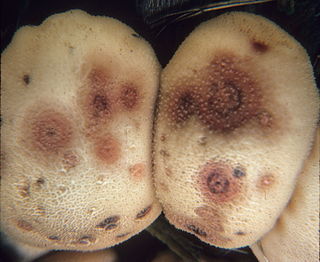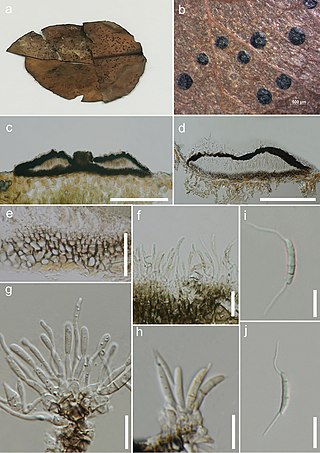
Stachybotrys is a genus of molds, hyphomycetes or asexually reproducing, filamentous fungi, now placed in the family Stachybotryaceae. The genus was erected by August Carl Joseph Corda in 1837. Historically, it was considered closely related to the genus Memnoniella, because the spores are produced in slimy heads rather than in dry chains. Recently, the synonymy of the two genera is generally accepted. Most Stachybotrys species inhabit materials rich in cellulose. The genus has a widespread distribution and contained about 50 species in 2008. There are 88 records of Stachybotrys on Species Fungorum, of which 33 species have DNA sequence data in GenBank. Species in the genus are commonly found in soil, plant litter and air and a few species have been found from damp paper, cotton, linen, cellulose-based building materials water-damaged indoor buildings, and air ducts from both aquatic and terrestrial habitats.

The Pleosporales is the largest order in the fungal class Dothideomycetes. By a 2008 estimate, it contained 23 families, 332 genera and more than 4700 species. The majority of species are saprobes on decaying plant material in fresh water, marine, or terrestrial environments, but several species are also associated with living plants as parasites, epiphytes or endophytes. The best studied species cause plant diseases on important agricultural crops e.g. Cochliobolus heterostrophus, causing southern corn leaf blight on maize, Phaeosphaeria nodorum causing glume blotch on wheat and Leptosphaeria maculans causing a stem canker on cabbage crops (Brassica). Some species of Pleosporales occur on animal dung, and a small number occur as lichens and rock-inhabiting fungi.

Bipolaris is a genus of fungi belonging to the family Pleosporaceae. It was circumscribed by mycologist Robert A. Shoemaker in 1959.
Broomella is a genus of fungi in the family Sporocadaceae.
Salsuginea is a genus of fungi in the class Dothideomycetes. The relationship of this taxon to other taxa within the class was unknown in 2007. Until Kevin D. Hyde & Tibpromma, 2013 introduced family Salsugineaceae within the order of Pleosporales.

Apiospora is a genus of fungi which cause plant diseases. It gives its name to the family Apiosporaceae, which contains a number of other genera. This is historically a name for the teleomorph (sexual) life-cycle stage of the fungus; for some species the corresponding anamorph name is Arthrinium.

Pestalotiopsis is a genus of ascomycete fungi in the Sporocadaceae family.

Monochaetia is a genus of fungi in the family Sporocadaceae. Species in the genus are typically plant parasites and saprobes, and cause leaf spot diseases on various hosts.

Cordana is an ascomycete fungus genus. In 2020, it was placed within the monotypic family of Cordanaceae, and within the order Coniochaetales.
Seimatosporium is a fungus genus within the family Sporocadaceae.

Stemphylium is a genus of fungal plant pathogen.
Canalisporium is a fungus genus of uncertain placement in the Sordariomycetes. It was placed in order of Savoryellales in 2020.

Glomerellales is an order of ascomycetous fungi within the subclass Hypocreomycetidae (Sordariomycetes). The order includes saprobes, endophytes and pathogens on plants, animals and other fungi with representatives found all over the world in varying habitats.

Dictyosporium is the type genus of fungi belonging to the family Dictyosporiaceae. By an estimate in 2018 it is formed by 45 species.

Epicoccum is a genus of fungi belonging to the family Didymellaceae.

Mariannaea is a genus of fungi belonging to the family Nectriaceae.

The Sporocadaceae are a family of fungi, that was formerly in the order Xylariales. It was placed in the Amphisphaeriales order in 2020.

Discosia is a genus of plant pathogens in the family Sporocadaceae.
Pseudopestalotiopsis is a genus of plant pathogens in the family Sporocadaceae.













